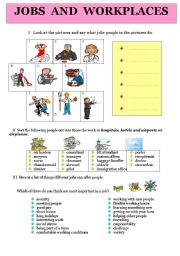
|
JOB AND WORKPLACES
WHAT AND WHERE PEOPLE CAN WORK, WHAT�S THE MOST IMPORTANT IN A JOB, QUESTIONNAIRE ABOUT PEOPLE�S PERSONALITIES, ABILITIES, PREFERENCES, AND ALSO SOME PROVERBS(short, pithy statementS of a general truth, ones that condense common experience into memorable form. Or, as defined by Miguel de Cervantes,a proverb is "a short sentence based on long experi...
Level: intermediate
Age: 10-17
Type: worksheet
Downloads: 44
|
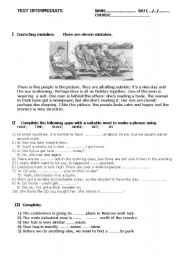
|
TEST INTERMEDIATE TEST YOUR STUDENTS
FINDING MISTAKES, MAKING PHRASES (USING MAKE, GET, WORK, TIME, PLACE, BY), FILLING GAPS WITH PREPOSITIONS, WORD FORMATION (NOUN-ADJECTIVE), TENSES(PRESENT AND PAST-MIXED), ADJECTIVES VS. ADVERBS, WRITING AN ESSAY....
Level: intermediate
Age: 12-17
Type: worksheet
Downloads: 27
|
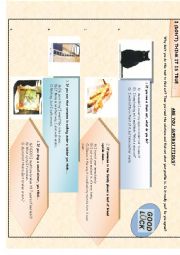
|
ARE YOU SUPERSTITIOUS QUESTIONNAIRE
This quiz is definitely useful for those who want to discuss about superstition, speak about what is considered lucky or unlucky in their culture...etc. I hope you�ll have a nice time!
Level: intermediate
Age: 12-17
Type: worksheet
Downloads: 20
|
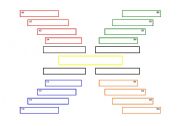
|
WORD ASSOCIATIONS
it�s perfect for completing classes, kids and adults like these very much!
How to play: the first sheet is the form for filling in with words in columns on the other page. There are five sets with already done associations. Take one of them. There are four columns, each has got four words, and the fifth is the one which makes some connection betw...
Level: elementary
Age: 9-17
Type: worksheet
Downloads: 17
|
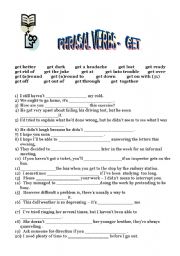
|
PHRASAL VERBS G E T
As you already know, phrasal verbs are students� nightmare, and we also have to look up the dictionary, searching for one specific, among innumerable meanings......
Level: intermediate
Age: 9-17
Type: worksheet
Downloads: 12
|
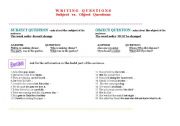
|
SUBJECT vs. OBJECT QUESTIONS
It is very difficult part for students to learn how to make questions without making lots of mistakes, so we should teach them as soon as possible and also explain them well.
Level: elementary
Age: 8-17
Type: worksheet
Downloads: 10
|
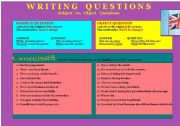
|
MAKING QUESTIONS - SUBJECT VS. OBJECT QUESTIONS
THERE ARE TWO DIFFERENT TYPES OF QUESTIONS WITH WHO AND WHAT - SUBJECT AND OBJECT. IT SHOULD BE EXPLAINED TO OUR STUDENTS CAREFULLY. BESIDES, THERE ARE QUESTIONS WITH WHERE(place), WHEN(time), WHY(reason), HOW(way of doing smth), HOW MUCH/MANY(quantity)... but it is always important to emphasize the WORD ORDER - QUESTION WORD + AUXILIARY VERB + SUB...
Level: elementary
Age: 10-17
Type: worksheet
Downloads: 10
|
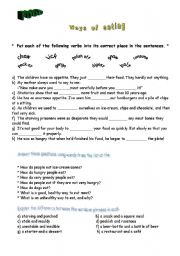
|
WAYS OF EATING
It is great opportunity to discuss about food, eating, people�s habits, manners; about what is good or not, what polite or rude, acceptable or not...and also to introduce some opposites, similar things or to talk about their differences using comparatives.
I hope you�ll find it useful!!!
Level: intermediate
Age: 9-17
Type: worksheet
Downloads: 8
|
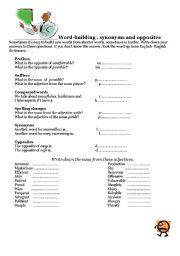
|
WORD BUILDING
Sometimes it�s easy to build new words from shorter or other kind of words, sometimes is harder. It is important to make the students learn how to deal with suffixes, prefixes, or compound words, or how to find their synonyms or opposites. They should take it like a game.
Level: intermediate
Age: 12-17
Type: worksheet
Downloads: 8
|
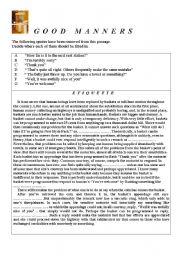
|
GOOD MANNERS
QUESTIONS FOR DISCUSSION:
Do tool-booths in your country have baskets or people to collect money? What is meant by "exchanged cordialities" in the last sentence? Why is it pleasant?
Why is politeness important with people?
What�s your experience about it?....
Level: advanced
Age: 12-17
Type: worksheet
Downloads: 7
|
|
|
|